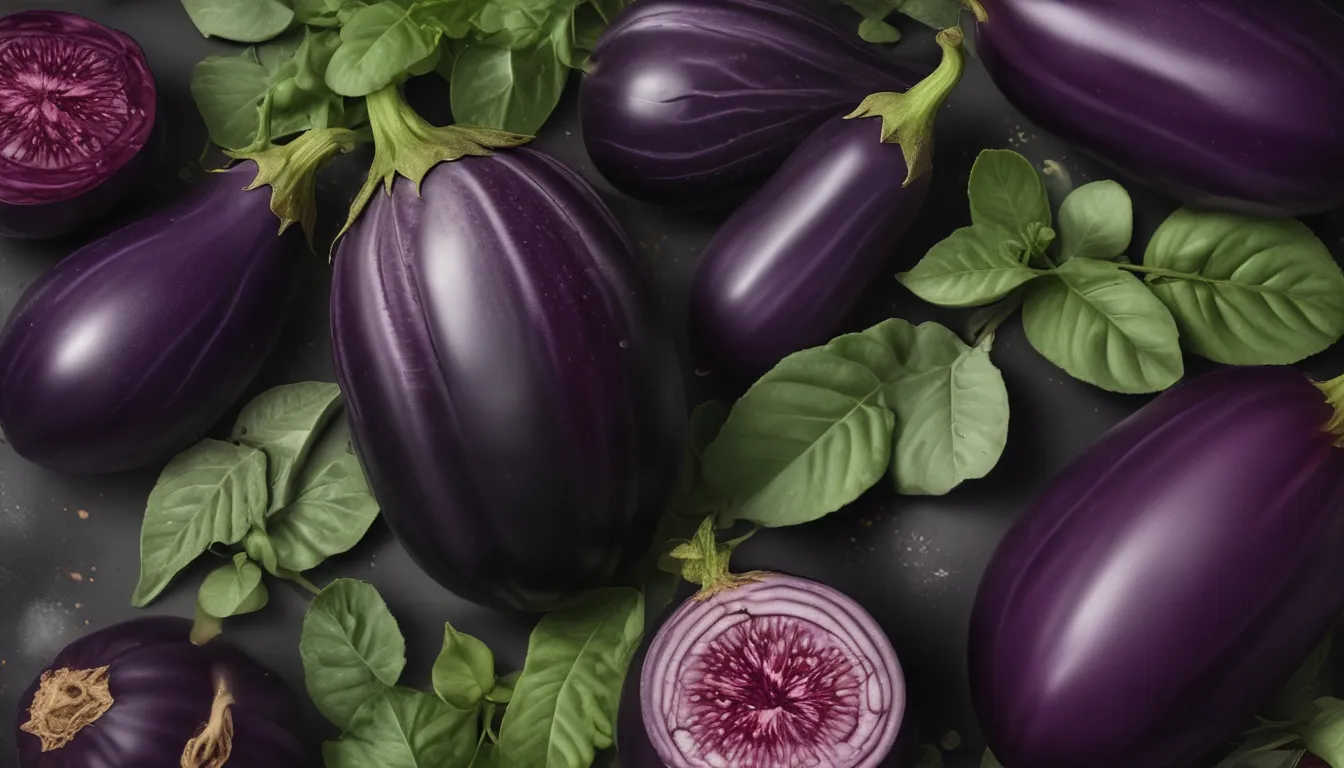The pictures in our articles might not always show exactly what the text is talking about. We use these images to make the article more interesting and eye-catching. They are there to add to the text, but not to replace it or show every detail.
Are you curious about the delightful vegetable known as eggplant? If not, get ready to uncover some intriguing details about this versatile member of the nightshade family. Eggplant, also known as aubergine, comes in a variety of shapes, sizes, and colors, from the classic dark purple to vibrant shades of green and white. This staple ingredient in many cuisines worldwide is cherished for its rich flavor and tender texture.
In this article, we will explore 19 captivating facts about eggplant that will spark your curiosity. From its ancient origins to its health benefits and culinary versatility, you'll gain a deeper understanding of this underrated vegetable. So sit back, relax, and prepare to expand your knowledge about the wonders of eggplant!
Key Takeaways:
- Eggplants are versatile and nutritious, coming in various colors and shapes. They’re low in calories, high in fiber, and great for heart health. Plus, their skin is edible and full of antioxidants!
- Originating in India, eggplants have over 2,000 varieties and are used in Mediterranean cuisine. They have a meaty texture when cooked and can improve brain function with their rich vitamins and minerals.
The Nightshade Beauty: Eggplant’s Family Connection
Eggplant, scientifically known as Solanum melongena, belongs to the nightshade family, which includes other popular vegetables like tomatoes, peppers, and potatoes.
A Taste of History: Eggplant’s Indian Roots
Dating back over 4,000 years, the eggplant is believed to have originated in India, where it has been cultivated and cherished for its culinary versatility.
Edible Beauty: The Skin of Eggplant
Contrary to common belief, the skin of an eggplant is not only edible but also packed with valuable nutrients and antioxidants, making it a nutritious addition to your dishes.
A Rainbow of Options: Eggplant’s Diverse Colors
While the traditional deep purple eggplant is well-known, it also comes in a variety of colors, including white, green, and even striped varieties, adding a pop of color to your meals.
Fiber Powerhouse: Eggplant’s Digestive Benefits
Loaded with dietary fiber, eggplants support healthy digestion and promote a happy gut, making them a nutritious choice for your meals.
Low-Calorie Wonder: Eggplant’s Weight-Friendly Nature
With just about 35 calories per cup, eggplant is a fantastic option for those looking to maintain a healthy weight or shed a few pounds, without compromising on taste.
The Many Faces of Eggplant: Over 2,000 Varieties
From the small and round Indian eggplants to the elongated Japanese varieties, there is a vast array of eggplant types to explore and enjoy in your culinary creations.
Antioxidant Boost: Eggplant’s Protective Powers
Packed with potent antioxidants like nasunin, eggplants help shield against oxidative damage and inflammation, promoting overall wellness.
Heart-Healthy Hero: Eggplant’s Benefits for the Heart
With high levels of potassium and fiber, eggplants support heart health by aiding in blood pressure regulation and reducing the risk of heart disease.
Culinary Chameleon: Eggplant’s Versatile Nature
Whether grilled, roasted, fried, or stewed, eggplant can be prepared in numerous ways and featured in a wide range of dishes, adding depth and flavor to your culinary adventures.
Global Naming Game: Eggplant vs. Aubergine
While eggplant is the common name in North America and Australia, it goes by the moniker "aubergine" in many parts of the world, particularly in Europe, adding a touch of global flair to your vocabulary.
Leading Producer: China’s Eggplant Empire
China takes the crown as the top producer of eggplant worldwide, followed closely by India and Egypt, showcasing the vegetable's popularity on a global scale.
Mediterranean Magic: Eggplant’s Role in Cuisine
From the iconic ratatouille to the hearty moussaka, eggplant shines in Mediterranean cooking, infusing dishes with its unique flavor and texture.
Spongy Delight: Eggplant’s Texture Tale
Thanks to its high water content, eggplants boast a sponge-like texture, ideal for absorbing flavors during cooking and creating delicious, aromatic dishes.
Meaty Marvel: Eggplant’s Meat Substitute Role
Transformed into a tender and meaty texture when cooked, eggplants serve as a satisfying option for vegetarian and vegan recipes, offering a satiating substitute for meat.
Hidden Gems: Edible Leaves and Flowers
While the fruit takes the spotlight, don't overlook the edible leaves and flowers of the eggplant plant, which can add a delightful touch to various culinary creations.
Brain Boost: Eggplant’s Cognitive Benefits
Studies suggest that the antioxidants found in eggplants can help protect brain cells and enhance cognitive function, making them a brain-healthy addition to your meals.
Nutrient Powerhouse: Eggplant’s Vitamin and Mineral Profile
Beyond being low in calories, eggplants provide a wealth of essential vitamins and minerals, including vitamin K, vitamin C, and potassium, supporting overall health and well-being.
In Conclusion
In conclusion, eggplant is a delightful and nutritious vegetable that offers a plethora of health benefits and culinary possibilities. Whether grilled to perfection, roasted to tender perfection, or blended into a delectable dip, eggplant is a versatile addition to any meal. With its fiber-rich content, antioxidant properties, and heart and brain-boosting benefits, eggplant deserves a special place in your kitchen. Embrace the culinary charm of eggplant and savor the many rewards it brings to your table!
FAQs
Q: Is eggplant a fruit or a vegetable?
A: Despite common perception, eggplants are botanically classified as fruits rather than vegetables.
Q: Can I eat eggplant skin?
A: Absolutely! Eggplant skin is not only edible but also contains a wealth of antioxidants, making it a nutritious addition to your dishes.
Q: Is eggplant high in calories?
A: Not at all! Eggplant is a low-calorie food, with just around 20 calories per cup, making it a smart choice for calorie-conscious individuals.
Q: Can eggplant help with weight loss?
A: Yes, indeed! With its high fiber content, eggplant can aid in promoting feelings of fullness and supporting digestion, making it a valuable ally in your weight loss journey.
Q: Are there different varieties of eggplant?
A: Certainly! Eggplant comes in a variety of shapes, sizes, and colors, offering a diverse selection to explore in your culinary experiments.
Q: Can eggplant help lower cholesterol levels?
A: Yes, eggplant contains sterols that have been shown to help lower cholesterol levels and promote heart health.
Q: Can I eat raw eggplant?
A: While safe to consume raw, eggplant is often more palatable and digestible when cooked to enhance its flavor and texture.
Q: Is eggplant suitable for gluten-free diets?
A: Absolutely! Eggplant is naturally gluten-free, making it a perfect choice for those with gluten sensitivities or celiac disease.
Q: Does eggplant contain vitamins and minerals?
A: Indeed! Eggplant is rich in essential vitamins and minerals like vitamin C, vitamin K, potassium, and folate, supporting overall health and wellness.
Q: Can I freeze eggplant?
A: Yes, you can freeze eggplant after blanching it to preserve its texture and flavor, offering a convenient way to enjoy this versatile vegetable year-round.
In our commitment to delivering accurate and engaging content, each fact shared on our site is contributed by real users like you, ensuring a diverse and authentic collection of insights and information. Our dedicated editors diligently review each submission to uphold the highest standards of accuracy and reliability, ensuring that the facts we present are not only fascinating but also trustworthy. Trust in our dedication to quality and authenticity as you delve into the world of eggplant and expand your knowledge with us.






